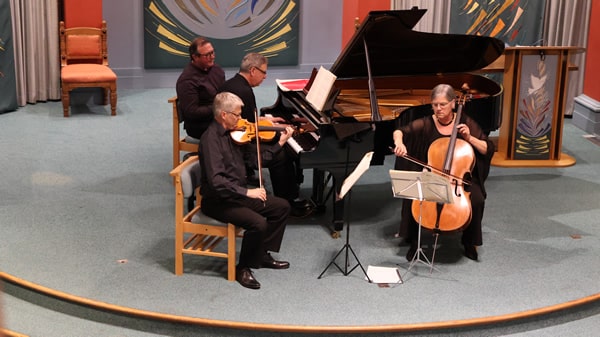Concert Review
Pirasti Trio (violin, cello, piano) – 21st October 2024
A PROGRAMME OF CONTRASTS
For the second concert of the Music club’s season the Pirasti Piano Trio performed an unusually imaginative programme – two unfamiliar pieces plus a stalwart of the Romantic repertoire.

Commendably Nicholas Miller (violin), Alison Wells (cello) and Jeffrey Starkey (piano) started with Rebecca Clarke (1886-1979), composer of notable chamber works and songs but better known in her day as a distinguished viola player. The arresting opening of her Piano Trio, composed in 1921, was a call to attention and immediately a sign that this was impressive music to be played with passion and style. The changing moods suggested hints of Debussy as did the reappearance of the opening motif throughout the three movements. There was also a nod in the direction of English folk music at the start of the finale. This was a persuasive performance by all three players of music created when female composers were not so common, music that still impresses and entertains.
Alison Wells then celebrated her return to Penrith and recalled the last time she performed in the Methodist Church when a pupil at QEGS in the 1970s – a nostalgic moment for several in the audience.
What followed was completely different. Paul Schoenfield (1947-2024), American composer who crossed many boundaries, based his Café Music on background music for diners. The three movements were great entertainment of catchy jazz rhythms and harmony. The performance was immaculate – no reason why classical musicians cannot swing along.
Brahms’s Trio in B major op.8 is a unique work in that it was written at the tender age of twenty, then revised thirty seven years later. He left the Scherzo intact but pruned the other three movements drastically; it thus combines the composer’s early exuberant melodic gifts with mature judgment of form (no padding). The Pirasti Trio gave a magisterial performance of this iconic piece. The first movement’s expansive melodies swept along with impressive ease; the Scherzo sparkled with rhythmic precision and the Trio relaxed into a beguiling Viennese lilt. The stillness of the Adagio was an oasis of welcome calm, beautifully managed by all three players. Cello and piano announced the main theme of the finale with finely judged balance – a happy blend of instruments built scenturies apart – Antonio Mariani (1670) and Steinway (1996) ! An amiable encore featured Jim Croce in an arrangement of his song Time in a Bottle – a tranquil final touch to an exceptional concert.
John Upson